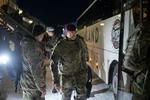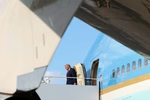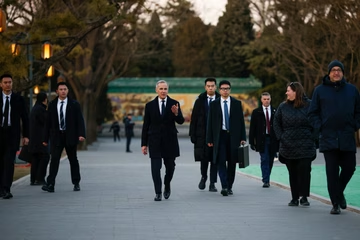American professor: Republika Srpska's secession would lead to instability

Bosnian Serb leader Milorad Dodik’s plan on the secession of Bosnia’s Serb-dominated entity, the Republika Srpska, would lead to instability in the country, but that it would not lead to war, Daniel Serwer, a professor at the Johns Hopkins University, and an expert for the Balkans, told N1’s Amir Zukic.
Oglas
"Dodik clearly said he’d be open to territory swap if it would lead to the RS’ independence. This would lead to instability, but I don’t think it would cause a war because there isn’t enough political will for such a thing,” Serwer said.
He warned that “we are facing a situation where people forget the dangers they went through in the past, which shouldn’t be forgotten and must always be remembered.”
Bosnia and Herzegovina went through a bloody war which lasted from 1992 to 1995. It left over 101,000 dead and over 2.2 million displaced people.
Oglas
It ended with the signing of the Dayton Peace Agreement in 1995 which redefined Bosnia as a country consisting of two semi-autonomous entities – the Serb-dominated Republika Srpska and the Federation of Bosnia and Herzegovina, shared by Bosniaks and Croats. There is also the Brcko District which is not dominated by either of the three majority ethnic groups.
Serwer pointed out that the US does not seem to be aware of this threat because the current administration is not as concerned with the Balkans region as earlier ones were.
But the professor added that the idea of the RS’ secession is only fantasy. In the 90s, Serwer said, the Balkan region was American priority number one, but now it is not even in the top 30. Only a few Washington officials deal with this region, which could be a good thing because it means the region is stable. Speaking about the Kosovo issue, Serwer said that it has the potential to destabilise Bosnia and maybe even North Macedonia.
“It could strengthen (Russian President Vladimir) Putin’s arguments on Georgia and Ukraine, which could then have much wider implications,” he noted.
Oglas
When asked of the ‘border correction’ plan was an American plan, he said he would not call it that.
"Americans said they are open to see whether Serbia and Kosovo could reach an agreement by themselves. It would be wrong even to consider such a proposal. Even if there were people in the US administration who would be ok with this proposal, many more would warn against it,” the US professor told N1.
He added that it would be impossible for the Serbian President, Aleksandar Vucic, to give up on a part of Serbia, and for Kosovo’s Thachi to give up on northern Kosovo.
Serwer concluded that a proposal where Belgrade and Pristina would swap territories and people would mean that both Serbia and Kosovo are unable to have a fair treatment towards minorities and it would be an admission of defeat of a sort.
Kakvo je tvoje mišljenje o ovome?
Učestvuj u diskusiji ili pročitaj komentare
Oglas
Kakvo je tvoje mišljenje o ovome?
Učestvuj u diskusiji ili pročitaj komentare
Oglas





 Srbija
Srbija
 Hrvatska
Hrvatska
 Slovenija
Slovenija



























































